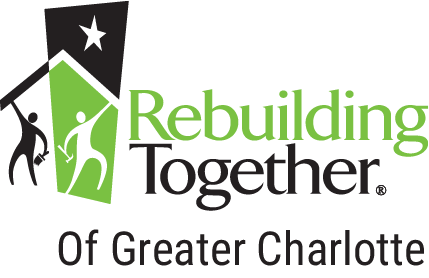RTGC Monitoring Needs in Western North Carolina in Response to Hurricane Helene
In response to the destruction and devastation of western North Carolina, Rebuilding Together of Greater Charlotte is currently allowing first responders and recovering organizations to respond. We are actively monitoring and assessing the situation and working with partners to figure out next steps once short-term recovery needs are met and how we might be able to help.
A Message from Executive Director Beth Morrison
On Tuesday, Oct. 8, Executive Director Beth Morrison shared a message updating the role RTGC will play in the recovery and rebuilding efforts in North Carolina following Hurricane Helene.
Right now, we are allowing first responders and emergency organizations to lead the immediate recovery. However, we are closely monitoring the situation and working with our partners to assess the long-term needs once the short-term recovery phase has passed. We are committed to doing what we can to support the rebuilding of homes and communities in the months ahead.
Applying for FEMA Assistance
If you or someone you know has been impacted by the hurricane, it is important to apply for FEMA assistance within the first 30 days of the disaster declaration. You can apply online at disasterassitance.gov or call 800-621-3362 for assistance. FEMA provides support for essential needs such as temporary housing, home repairs, and other disaster-related expenses.
Tips for Hiring Contractors
The recovery process after Hurricane Helene is underway, and many homeowners will be looking for contractors to help repair the damage and rebuild their homes. Unfortunately, times like these often attract untrustworthy people who take advantage of homeowners in need. It’s important to be cautious and take steps to ensure you hire a reputable contractor who will do quality work. Director of Construction Nikki Quick has provided some tips to help you make the right choice and avoid contractor fraud.
Be Cautious of Contractors Soliciting Business.
Watch for Red Flags.
Get a Written Contract Before Work Begins.
Avoid Full Advance Payments.
Be Vigilant About Poor Workmanship.
Verify Licensing and Insurance.
Avoid “Storm Chasers” – Out-of-State Contractors.
Don’t Rush the Process.
Ways to Volunteer in Recovery Efforts
If you are interested in volunteering in disaster recovery efforts, please visit Volunteer NC, an organization looking for volunteers to help serve with disaster services across the state.
The information you provide will be shared with NC VOAD (Voluntary Organizations Active in Disaster), a network of organizations that collaborate to support disaster response and recovery efforts in North Carolina. As recovery remains in the initial response phase, Volunteer NC kindly asks for your patience, as many of the organizations involved are still in the process of setting up their sites.
Ways to Donate to Recovery Efforts
Governor Roy Cooper announced that the North Carolina Disaster Relief Fund is now accepting contributions for hurricane damage. Contributions to the fund help with the unmet needs of hurricane victims.
Additionally, Blue Ridge Public Radio has compiled a list of ways to support recovery efforts and donate to those affected. You can access this resource here: Ways to Donate and Help Flood Victims in Western North Carolina.
We will continue monitor the situation and update this page as recovery efforts evolve. Thank you for your continued support of our community. Together, we can help rebuild and restore hope.
This post was originally published on Sept. 30. It was updated on Oct. 7 to include a link to tips for hiring a contractor, Oct. 8 to include a message from Executive Director Beth Morrison, and Oct. 10 to include a link to register for volunteering with Volunteer NC.
